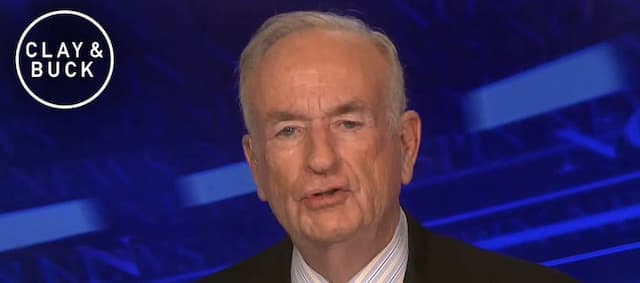Whoopi Goldberg Whitewashes the Holocaust
BUCK: Let’s talk about The View for a moment here. This is Whoopi Goldberg explaining her view of what was behind the Holocaust in World War II. Listen to this. Play it.
Sparks fly as The View panel confronts Whoopi after she says “the Holocaust isn’t about race. No. It’s not about race.”
“Well, the considered Jews a different race,” Joy Behar says.“But it’s about white supremacy. It’s about going after Jews and Gypsies,” Ana Navarro adds. pic.twitter.com/GZwZSi2qXi
— Nicholas Fondacaro (@NickFondacaro) January 31, 2022
BUCK: Okay, okay, this is… Enough. Enough. Enough. First of all, to say that the Nazi genocide of Jews and the Nazi genocide generally — six million Jews, 11 million people — if you go to the Holocaust Museum in D.C. (which I’ve been to a couple of times), this is all laid out for everyone there. It was so explicitly about race and about demonizing Jews as a race as well as other people that there was tremendous amounts of Nazi propaganda devoted specifically to that, Clay, as we all know. In fact, they also went after what are now known as Roma, which were known as Gypsies at the time.
They don’t like that term, but people often still think of it as Gypsies. Almost 90% of European Roma — again, a distinct race — were exterminated in the death camps. Jews were clearly exterminated to the tune of over six million of them unbelievably, horrifically murdered in the death camps,11 million people total. Does Whoopi Goldberg know anything? Why is she even talking about this?
CLAY: I don’t even know what her point was, right? The View oftentimes has stupid opinions. The difference, Buck, between what The View would argue and what we would argue is, when they have stupid opinions, we play their clip and we ridicule the stupidity of their opinions. But we don’t say Whoopi Goldberg and Joy Behar shouldn’t be able to be on television, right? We don’t say they shouldn’t be able to be on a broadcast or a podcast or anything else.
BUCK: We certainly don’t call for the White House, Clay, to speak from the White House podium and say that… Are they on ABC program? Is that right? I don’t even know.
CLAY: I think that’s a syndicated program that’s on. It’s a great question. I’m not even sure who produces it.
BUCK: But you and I certainly would never say let’s have the White House, because they’re spreading misinformation. I mean, to say the Holocaust is not about race and to undermine and to whitewash the evil of it in doing so, we would never still go and say that the White House should declare that their corporate or parent company should kick them off and not let them speak. No. We’ll say, “Look, she didn’t mean to…”
I understand this. I’m not gonna do what the left does. She wasn’t trying to be disrespectful. I know that. I actually know people who say Whoopi Goldberg is a very nice person. I’ll speak honestly about. They’ll say she’s a very nice lady in person. But she’s really wrong. But we should have the debate. We should have the discussion about wrongness and clarify this for people and not say, “You should never be allowed to speak in public again.”
CLAY: The cure for falsehood is accuracy. The cure for speech you disagree with, to me, has always been more speech. This was traditionally a very — and I hate getting involved in the spectrum of political beliefs. But the idea of a marketplace of ideas is a traditionally very liberal idea, and I don’t mean that in the sense of, like, “Oh, we have to, you know, have 70% tax rates and we have to have socialism,” things like that. I just mean the idea of the full flourishment of debate was something that was so widely accepted, Buck.
And this is what scares me about our society today, is we have moved from “I disagree with you and I am going to make an argument against the one that you just made” to “I disagree with you and you do not have the right to have that opinion, and you are racist, you are sexist, you are homophobic, you are transphobic, you’re a Nazi.” We immediately attack the speaker, right?
So again, it might sound like a subtle nuance in the difference between debating ideas and attacking people. But we have pivoted to such an extent — and what scares me, Buck, is the people who are most in favor of regulating speech are young people. On college campuses, there are substantial majorities of kids right now that believe if someone says something that hurts your feelings, they shouldn’t be able to say that.
BUCK: And the same people that claim that they have a stranglehold, if you will, on truth — and this all comes from the left. It is true these days, if you are a person who believes in liberty even at the expense of what you want to be an outcome, you’re on the right. You cannot see a person on the left these days and say that —
CLAY: Yes.
BUCK: — and you see this with who’s being driven in terms of their audience. You’ve got people like Glenn Greenwald. Glenn Greenwald and I used to debate jihadism and terrorism back in the day, a man firmly on the left, but principled in why he believes what he believes, which now makes him oftentimes on the right on issues.





